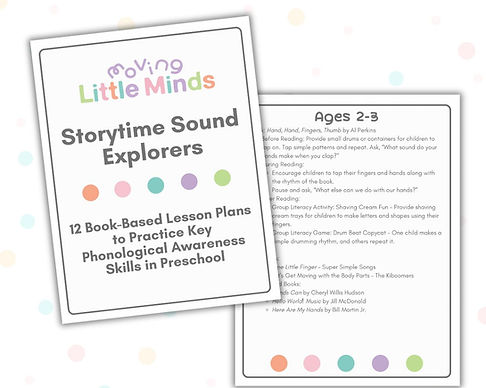10 Water Activities for Preschoolers that Merge Learning with Play
- Melissa McCall
- Jun 16, 2025
- 4 min read

These are 10 of our favorite water activities for preschoolers that embrace literacy make learning a splash!
When summer hits, everything shifts. The sun feels stronger, the kids get louder, and the energy is HIGH! I always feel the pull to get outside, to ditch the routine, and to just let kids be kids. But when you’re running a preschool summer camp or still in session during those hot months, it’s easy to wonder: Can we still keep learning while we play? Can we do both?
Yes. And the answer is simple: just add water.
As the school year winds down and the days may become a little less structured, it’s the perfect time to soak up the sunshine. and bust out water activities for preschoolers! Whether you’re leading a year-round classroom or summer programming, water play gives children the chance to move, laugh, and explore and keeps literacy learning alive in the most fun ways!
Here are 10 playful, water-filled literacy activities that bring splashes and skill-building to your summer days.
1. Letter Squirt
Materials: Solo cups, permanent marker, water blaster or squirt gun
Steps:
Write individual letters on plastic cups.
Line them up in the large open area or on a ledge.
Call out a letter and have children squirt the matching cup.
Benefits: Reinforces letter recognition, strengthens hand-eye coordination, and builds listening skills.
2. Paint the Letter
Materials: Sidewalk chalk, paintbrushes, cups of water
Steps:
Write letters or names on the pavement in chalk.
Let children “paint” over them with water using paintbrushes.
Or, call out a letter and watch child paint the letter using freehand.
Benefits: Strengthens letter formation, fine motor skills, and pre-writing abilities in a calming, sensory way.
3. Paint the Letter Sound
Materials: Chalk, small objects (cat, cup, sock, etc.), paintbrushes, water
Steps:
Place objects spread out on the pavement.
Say the object’s name aloud.
Children run to the object and paint the beginning sound on the ground (e.g., “s” for sock).
Race to see how quickly you can paint and head to the next object.
Benefits: Builds phonemic awareness and sound-letter connections while keeping little hands engaged and bodies moving.
4. Splat the Letter
Materials: Sidewalk chalk, filled water balloons
Steps:
Write letters on the ground.
Give each child a water balloon.
Call out a letter.
Choose a child to run to the letter and throw a water balloon on top of it...splat!
Benefits: Reinforces letter identification and builds gross motor skills and aim.
5. Water Balloon Rhyme Toss
Materials: Water balloons
Steps:
Pair up children and have them stand a short distance apart.
Call out a word, such as "cat".
Toss the water balloon back and forth while saying a word that rhymes with "cat".
Take a step back after each successful catch. How far can they go without bursting it?
Benefits: Encourages phonological awareness and eye-hand coordination.
6. Water Balloon Reading
Materials: Water balloons, permanent marker, bucket, letters posted on a wall
Steps:
Write 4-5 consonant letters on a wall or open ground.
Write ending word families on the water balloons (-et, -ig, -at).
Children grab a water balloon, say the word family.
Next, children choose a consonant, and blend the parts to for a real word - b....at...bat.
Toss the balloon at the letter “b” on the wall while saying the word.
Benefits: Supports blending and segmenting skills while teaching word families in a multi-sensory format.
7. Alphabet Walk & Squirt
Materials: Squirt bottles, sidewalk chalk
Steps:
Write letters A–Z along a sidewalk or cement area
Go on an “alphabet hunt,” calling out each letter and having the child squirt it with the squirt bottle.
Benefits: Combines movement, letter sequencing, and strengthens hand muscles used for writing.

8. Alphabet Pool Search
Materials: Kiddie pool, water, bubbles, foam or magnetic letters
Steps:
Hide letters in a bubble-filled pool.
Children dig through the bubbles in the pool to find letters.
Use a chart to track which letters children find.
Benefits: Develops letter identification, sensory exploration, and cooperation during group play.
9. Sound Splash Sort
Materials: Buckets or tubs labeled with beginning sounds (e.g., B, M, S), small waterproof toys or picture cards
Steps:
Children pick a toy or card (e.g., ball, monkey, sock).
Say the word aloud, emphasize the beginning sound.
Splash it into the matching bucket!
Benefits: Promotes phoneme isolation (beginning sounds) and sound-symbol association.
10. Tell a Story Car Wash
Materials: Toy cars, shallow water trays or “car wash” stations, laminated setting cards (playground, fair, school, beach).
Steps:
Benefits: Encourages imaginative storytelling and language expression—all while incorporating dramatic play and fine motor skills.
Why This Works for Preschoolers
Water play naturally grabs children’s attention—and when you combine it with literacy, the results are powerful. These activities tap into what preschoolers do best: explore, imagine, and move. Whether you're practicing sounds, building vocabulary, or retelling stories through splashes and giggles, you're doing more than just filling time. You're nurturing confident, curious learners. So go ahead...get a little messy. Because when play meets purpose, real learning sticks.
Don't miss an update from Moving Little Minds! SUBSCRIBE HERE!

We believe that every child deserves a bright future, and this begins with a strong foundation in early literacy skills. At Moving Little Minds, we are dedicated to providing research-based literacy activities in fun and engaging ways! By merging instruction with play, we ensure that children are reaching their full potential and embark on their educational journey well-prepared for the
future! Let's build those KEY emergent literacy skills together.






















%20(52).jpg)

Comments